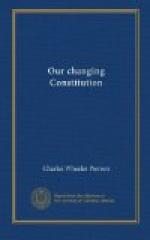[Footnote 1: 9 Wheat., 1 (1824).]
These were only a few of that series of great decisions which stand out like mountain peaks on the horizon of our national life. Marshall’s judgments transformed a governmental experiment into something assured and permanent. They confirmed the national supremacy and made the Constitution workable.
Marshall is known to history for his work in vindicating the national power under the Constitution. That was the need in his day and he met it with superlative wisdom and skill. It would be a mistake, however, to suppose that he favored federal encroachment upon the powers reserved to the states. On the contrary, he rendered decisions in favor of state rights which would be notable were they not overshadowed by the greater fame of the decisions which went to the building of the nation.
With the passing of Marshall and the accession of Taney as Chief Justice a new chapter opened in the history of the Court. The Federalists had become extinct. Andrew Jackson had come into power and it had fallen to his lot to fill a majority of the seats upon the bench by appointments to vacancies. The result was at once apparent. Two cases[1] involving important constitutional questions, which had been argued during Marshall’s lifetime but assigned for reargument on account of a division in the Court, were now decided contrary to Marshall’s known views and in favor of a strict construction of national powers. Justice Story, Marshall’s longtime associate on the bench, dissented strongly in both cases, lamenting the loss of Marshall’s leadership and the change in the viewpoint of the Court.
[Footnote 1: Mayor of New York v. Miln, 11 Peters, 102; Briscoe v. Bank of Kentucky, 11 Peters, 257, decided in 1837.]
It would serve no useful purpose to enter upon a detailed consideration of the various decisions upon constitutional questions made during the twenty-eight years of Taney’s Chief Justiceship. They were marked by great diversity of views among the members of the Court. In some of them, notably the famous Passenger cases,[1] the Court fell into a state reminiscent of the confusion of tongues that arose at the building of the Tower of Babel. The scope of certain of Marshall’s decisions was limited.[2] Upon the whole, however, the structure of constitutional law which Marshall had reared was not torn down or greatly impaired. The national supremacy was upheld. Taney and his associates were for the most part patriotic men




